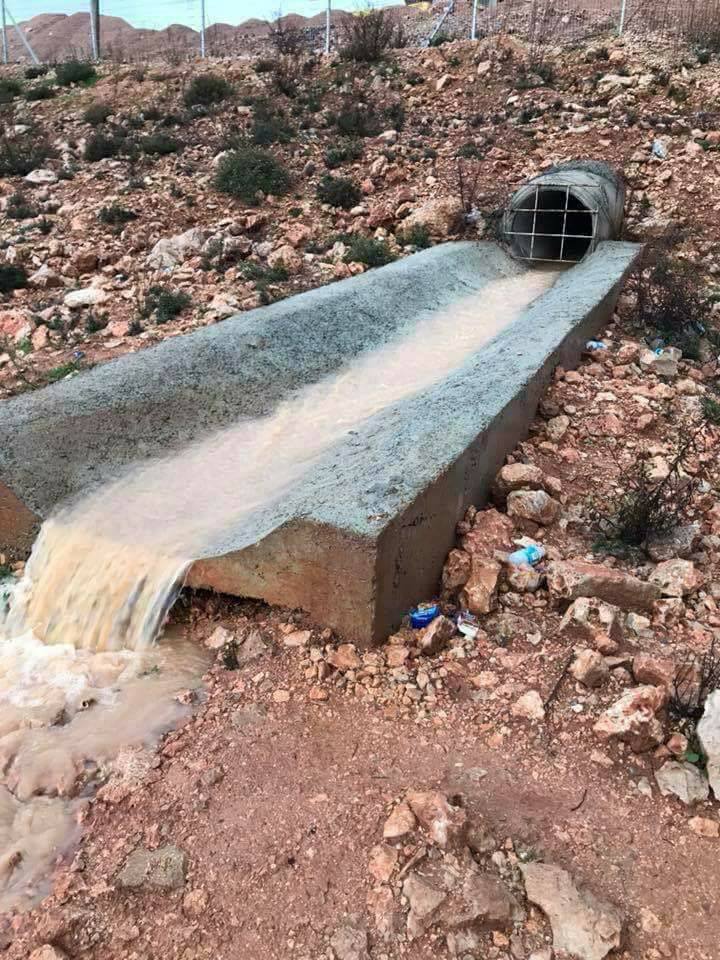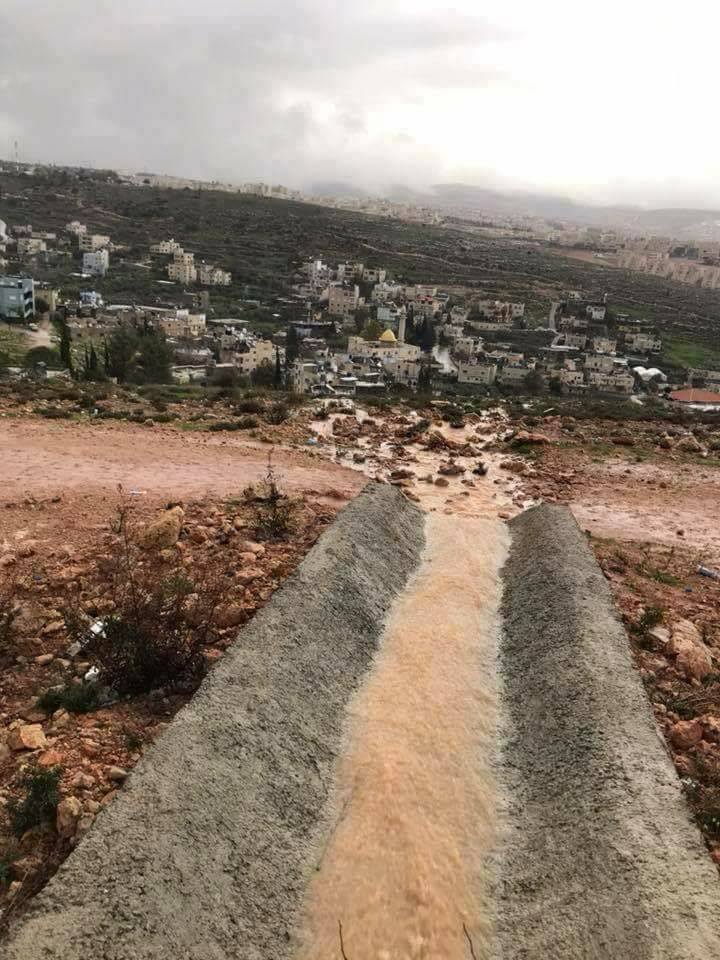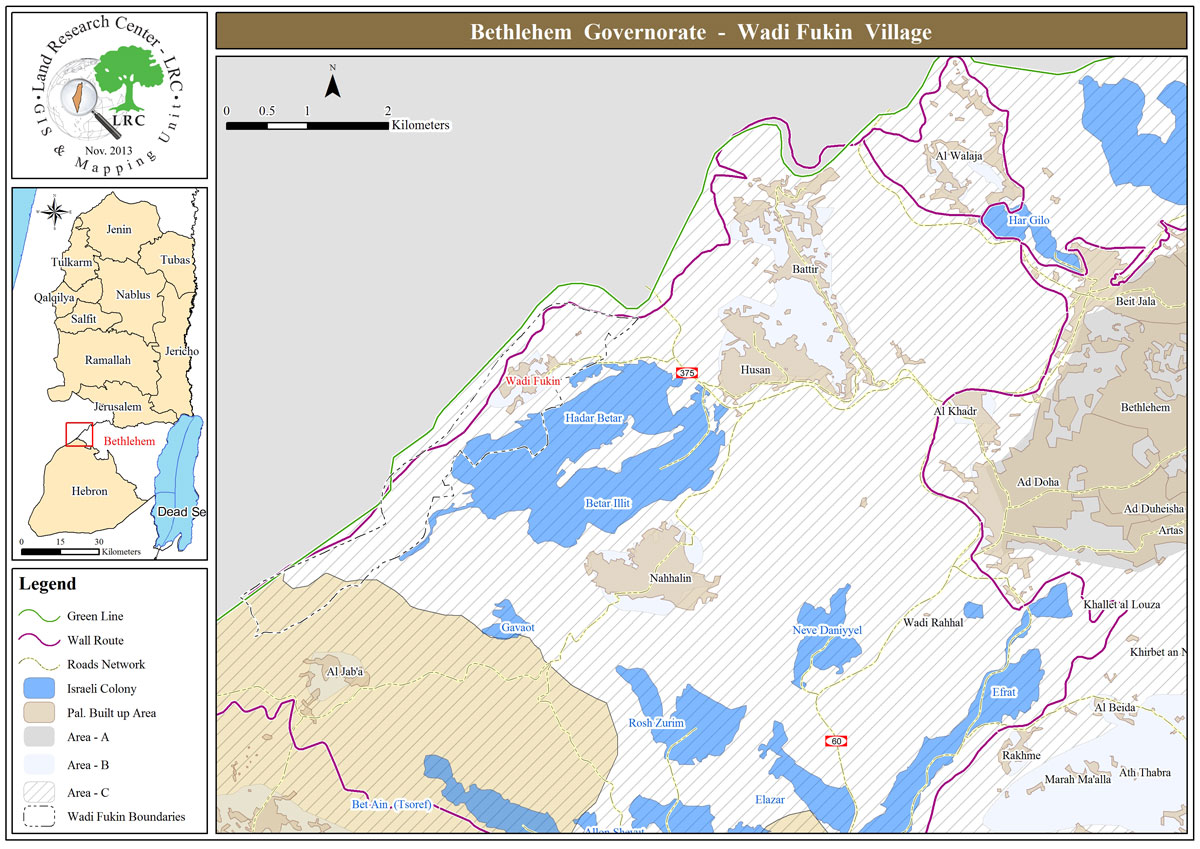2018-01-19
Tsor Hadasa colony pumps sewage water into Bethlehem lands
Violation: disposing sewage water into Palestinian lands
Location: Wad Fukin village- Bethlehem
Date: January 19, 2018
Perpetrators: Tsor Hadasa colony
Victims: residents of Fukin
Details:
Due to cutting down the pastoral trees --in the confiscated lands on which Tsor Hadasa colony is located-- and excessive rainfall, Wad Fukin lands were sunk in the colony's drained water and sewer. It is reported that houses of the village sustained partial damage where some walls fell apart due to the floods caused by the drainage system in the colony, which pumps into Wad Fukin lands.
It should be noted that the construction of residential units in the colony's location, which is atop a hill overlooking Wad Fukin area caused the following environmental hazards:
- Formation of floods
- Soil erosion and damage to the agricultural infrastructure
- Blockage of water springs
- Damage to the land cover


It is worth mentioning that residents of the village depend on the affected water springs in irrigating their crops and lands. The blockage in water spring will negatively affect the agricultural sector in the area.
It is reported that Tsor Hadasa colony causes continues damage to Wad Fukin by pumping sewage and waste water into the lands of the village. As a result, many agricultural lands became unsuitable for cultivation and crops died, causing economy to be badly stoke and hundreds of farmers left without source of income.
About Wad Fukin:
It is located 15 kilometer to west of Bethlehem and is surrounded by the borders of 1967 (north and west), Nahhalin and Husan (east), and Jab'a (south).
Wad Fukin has a total population of 1168 according to statistics conducted in 2007. It has a total area of 3817 dunums, of which 161 dunums are considered built-up area.
The Israeli occupation confiscated 299 dunums of Wadi Fukin lands for the sake of two colonies. The first is Har Hadasa which was built in 1978 and devoured 4 dunums while the other is Betar Illit which was built in 1985 and confiscated 295 dunums.
The Apartheid Wall confiscated 402 dunums and isolated 980 dunums in a way that denies people access to their lands. The length of the constructed Wall on Fukin lands is 4,029 meters.
According to Oslo Accords, 7% of Wad Fukin is under Area B (PA is in charge of civil matters with Israel responsible for security) while most of the village lands (93%) is under Area C (Israel maintains full security and administrative control). Here are the area in dunums:
Area B (275) dunums
Area C (3500) dunums

Land Research Center sees Israel continuous expansion on colonies in the West Bank and Jerusalem at the expense of Palestinian and lands a flagrant violation of Human Rights and all international laws and conventions, which prohibit disposition of public properties in occupied countries.
UN Resolutions
UN Security Council Resolution 242 of 1967: calls for
the Withdrawal of Israel armed forces from territories occupied in the recent conflict;
Termination of all claims or states of belligerency and respect for and acknowledgment of the sovereignty, territorial integrity and political independence of every State in the area and their right to live in peace within secure and recognized boundaries free from threats or acts of force." [4]
UN Security Council Resolution 449 of 1979: the Security Council determined:
"that the policy and practices of Israel in establishing settlements in the Palestinian and other Arab territories occupied since 1967 have no legal validity and constitute a serious obstruction to achieving a comprehensive, just and lasting peace in the Middle East"
UN Security Council Resolution 452 of 1979: states that
"the policy of Israel in establishing settlements in the occupied Arab territories has no legal validity and constitutes a violation of the Fourth Geneva Convention relative to the Protection of Civilian Persons in Time of War of 12 August 1949" and "calls upon the Government and people of Israel to cease, on an urgent basis, the establishment, construction and planning of settlements in the Arab territories occupied since 1967, including Jerusalem."
UN Security Council Resolution 465 of 1980:
It expressed concern at Israeli settlement policy in the Arab territories and recalled resolutions 237 (1967), 252 (1968), 267 (1969), 271(1969) and 298 (1971). It further called upon the State and people of Israel to dismantle such settlements. The resolution calls on all states ‘not to provide Israel with any assistance to be used specifically in connection with settlements in the occupied territories’.
UN Security Council resolutions in regard to Israeli colonies:
UN Security Council resolution 446, article 3 " Calls once more upon Israel, as the occupying Power, to abide scrupulously by the 1949 Fourth Geneva Convention, to rescind its previous measures and to desist from taking any action which would result in changing the legal status and geographical nature and materially affecting the demographic composition of the Arab territories occupied since 1967, including Jerusalem, and, in particular, not to transfer parts of its own civilian population into the occupied Arab territories;"
Un Security Council resolution 452, article 3"Calls upon the Government and people of Israel to cease, on an urgent basis, the establishment, construction and planning of settlements in the Arab territories occupied since 1967, including Jerusalem;"
Un Security Council resolution 465, Strongly deplores the continuation and persistence of Israel in pursuing those policies and practices and calls upon the Government and people of Israel to rescind those measures, to dismantle the existing settlements and in particular to cease, on an urgent basis, the establishment, construction and planning of settlements in the Arab territories occupied since 1967, including Jerusalem;
Calls upon all States not to provide Israel with any assistance to be used specifically in connexion with settlements in the occupied territories;
Un Security Council resolution 242, Affirms that the fulfilment of Charter principles requires the establishment of a just and lasting peace in the Middle East which should include the application of both the following principles:
(i) Withdrawal of Israel armed forces from territories occupied in the recent conflict;
(ii) Termination of all claims or states of belligerency and respect for and acknowledgment of the sovereignty, territorial integrity and political independence of every State in the area and their right to live in peace within secure and recognized boundaries free from threats or acts of force;

The contents of this document is the sole responsibility of LRC and can under no circumstances be regarded as reflecting the position of the European Union
